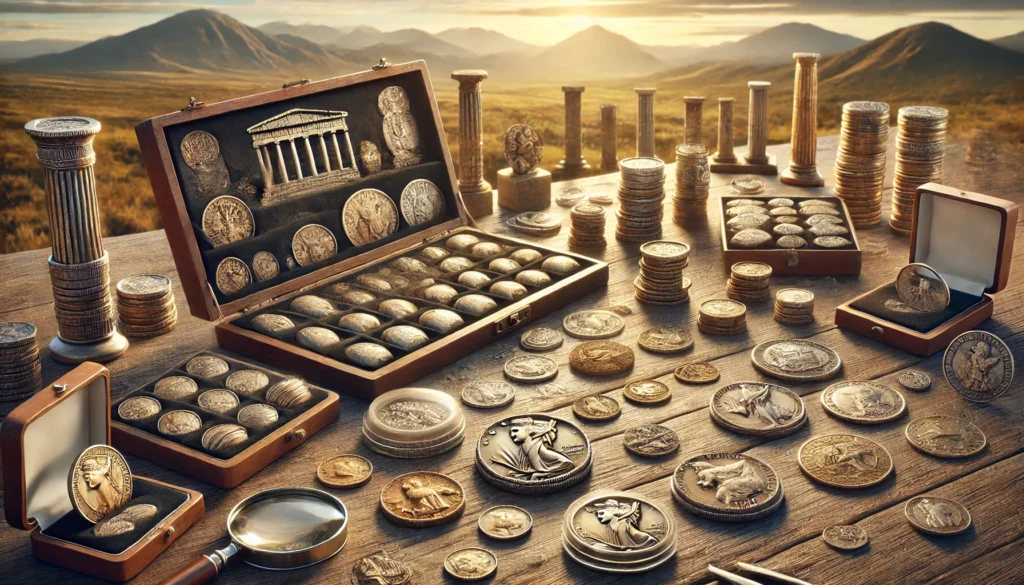Collectible coins have long captivated enthusiasts and investors, with their values often soaring beyond the intrinsic worth of the precious metals they contain. This phenomenon can be attributed to a combination of factors, including rarity, historical significance, and artistic beauty, that elevate these coins from mere currency with an imprinted face value to highly sought-after treasures. Let’s unpack these factors a little bit.
Rarity
When a coin becomes rare, it becomes more sought after and, therefore, more valuable. One of the most compelling examples of a coin’s rarity driving its value up (way up!) is the 1913 Liberty Head Nickel. Only five of these coins are known to exist, making them among the rarest and most valuable coins in the world. To the average person, who might not be aware of the real value of this coin, it’s just another old nickel. In 2018, however, one of these nickels, known as the Eliasberg specimen, sold at auction for a staggering $4.56 million. Clearly, the coin’s value is not derived from its metal content or imprinted face value, but from its extraordinary scarcity.
1913 Liberty Head Nickel
Courtesy Wikipedia
Historical Significance
Another factor contributing to the value of collectible coins is their historical significance. For example, the 1794 Flowing Hair Silver Dollar holds a special place in American numismatic history as the first silver dollar coined by the United States Mint. In 2013, a specimen graded MS-66 (see next section for a brief overview on grading) sold at auction for $10,016,875, setting a new record for the most expensive coin ever sold at the time. The coin’s value is a testament to its historical importance and its role in shaping the nation’s currency.
Flowing Hair Silver Dollar
Courtesy Wikipedia
A Word About Grading Coins
Because the condition of a collectible coin is a crucial factor in determining its value, (often paired with rarity), here is a brief summary of how coin grading works.
In the United States, the Sheldon Scale is the most widely accepted grading system, ranging from 1 (poor condition) to 70 (perfect, flawless). Coins graded 60 or higher are considered “Mint State” (MS), showing no signs of wear from circulation. The difference in value between coins of the same type and year can be substantial based on their condition.
Circulated coins with signs of wear are graded from 1 to 59, with grades like AU (About Uncirculated) and XF (Extremely Fine) indicating the degree of wear. Collectors and investors seek out coins in the highest possible condition, often relying on professional third-party grading services, such as PCGS or NGC, to provide reliable assessments of a coin’s condition and authenticity, which supports higher values for high-grade coins.
Artistic Merit and Beauty
Artistic merit and beauty also play a significant role in a coin’s collectible value. The 1907 Ultra High Relief Saint-Gaudens Double Eagle, often considered one of the most beautiful American coins ever produced, exemplifies this principle. This stunning coin is truly a work of art, designed by Augustus Saint-Gaudens, an Irish-American sculptor who embodied the ideals of the American Renaissance. Saint-Gaudens’ design features a striking high-relief portrait of Lady Liberty on the obverse and a majestic flying eagle on the reverse, showcasing the artist’s skill and attention to detail. In 2023, one of these masterpieces sold at auction for $20.7 million, demonstrating the premium collectors are willing to pay for coins that possess not only historical significance but also exceptional aesthetic quality.
1907 High Relief Double Eagle
Courtesy Wikipedia
Precious metals companies, such as 7k Metals, recognize the enduring and growing interest in collectible coins and have responded by offering them alongside their traditional bullion products. These companies have developed their own portfolios and collectible coin offerings that provide customers with access to collectible coins valued for their historical significance, rarity, and artistic beauty. For example, 7k has created its own featured series of collectible coins designed by world-class artists commissioned specifically for those collections, including their recently released collection “An American Life: JFK” designed by world-famous numismatic artist and expert Michael “Miles” Standish.
7k Metals and other precious metals companies like them understand that collectors and investors are drawn to numismatic coins not only for their potential financial returns but also for their historical, artistic, and emotional value. By providing access to a wide range of collectible coins, including custom-created and commissioned collections, these companies enable enthusiasts to own a piece of history and participate in the thriving numismatic market. This approach allows collectors to diversify their portfolios and enjoy the unique benefits of owning rare and beautiful coins.

